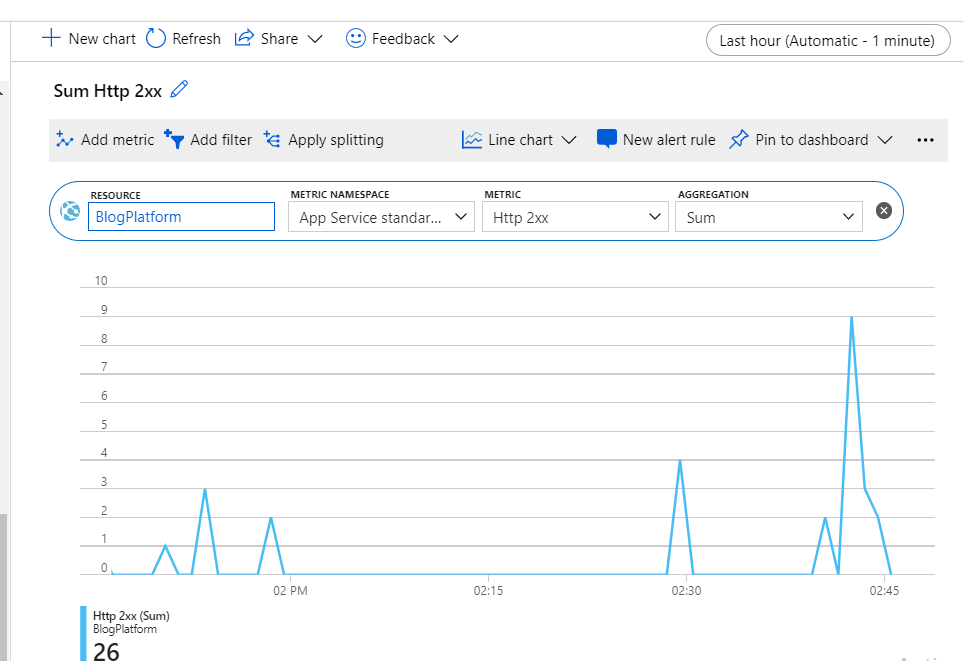Azure App Service Web Apps (or just Web Apps) is a service for hosting web applications, REST APIs, and mobile back ends.
Web Apps has,
You can also take advantage of its DevOps capabilities, such as continuous deployment from Azure DevOps, GitHub, Docker Hub, and other sources, package management, staging environments, custom domain, and SSL certificates.Web Apps has,
- Supports Windows and Linux platforms
- Built-in auto scale and load balancing (scaling architecture guide)
- High availability with auto-patching (How Azure Handles Patching)
- Continuous deployment with Git, Team Foundation Server, GitHub, and DevOps
- Supports WordPress, Umbraco (Umbarco hosting in Azure), Joomla!, and Drupal
You can scale up or out manually or automatically. App services are ISO, SOC and PCI compliant.
In Azure apps runs in an App Service plan. It defines set of compute resources for a web app to run. These resources are much analogues to a server farm.
Pricing tiers (Hosting plans in depth)
Shared compute (Free and Shared): Runs on same Azure VM as other App service apps. These resources cannot scale out- Intended only for development and testing
Dedicated compute (Basic, Standard, Premium and Premium V2) runs on dedicated Azure VMs. Only apps in same App Service plan share the same compute resources. Higher the tier, the more VM instances are available to you for scale-out
Isolated : Runs on dedicated Azure VMs on dedicated Azure Virtual Networks, provides network isolation on top of compute isolation to your apps. Provides maximum scale-out capabilities.
Consumption: Only available for function apps. Scales the functions dynamically depending on the workload.
Except Free and Shared tiers (which cannot scale out), if multiple apps are in same App Service plan, they all share same VM instances.
Azure - Comparison of Web hosting options
Azure offers several ways to host web sites: Azure App Service, Virtual Machines, Service Fabric, and Cloud Services. Azure even supports Azure dedicated hosts where you can configure to use a single physical machine for all your applications and servers in Azure.
https://docs.microsoft.com/en-us/azure/app-service/choose-web-site-cloud-service-vm
If you had hosted a web app with a previous version, when upgrading you'll run into Cannot find compilation library issue which can be solved by clearing wwwroot folder.
Deploying Web Apps from Visual Studio
You can directly publish to Azure Web App from Visual Studio using publish tool. When you give azure subscription details and web app you want to publish to, Visual Studio will directly publish the files to the web app. Kudu is the engine behind git deployments in Azure.If you had hosted a web app with a previous version, when upgrading you'll run into Cannot find compilation library issue which can be solved by clearing wwwroot folder.
Azure Web Apps carries capability to scale up (More CPU, memory disk space) as well as Scale out (Increase number of VM instances).
You can also monitor Metrics in Azure. It gives real-time overview of how the application behaves in different metrics.
Logs are important in any web application to see what kind of errors, warnings applications gives when running. App service logs and Log stream helps you seeing these. You can configure these in App service logs to view in Azure itself via. Log stream or upload it to storage of file system.
Process explorer is not frequently used feature which enables us to see currently running processes.
But theses performance tests are now deprecated. There are few reasons why cloud based load testing is reaching end of life due to how practical and pragmatic load testing are. Therefore performance tests in Azure is reaching end of life.
Monitoring Web Apps in Azure
There are few tools Azure provides to monitor web apps in Azure. You can define rules which gets triggered based on a condition such as spikes in request count, CPU usage etc.You can also monitor Metrics in Azure. It gives real-time overview of how the application behaves in different metrics.
Logs are important in any web application to see what kind of errors, warnings applications gives when running. App service logs and Log stream helps you seeing these. You can configure these in App service logs to view in Azure itself via. Log stream or upload it to storage of file system.
Process explorer is not frequently used feature which enables us to see currently running processes.
Running Performance Tests in Azure Web Apps
Azure Web Apps allows you to run performance tests.But theses performance tests are now deprecated. There are few reasons why cloud based load testing is reaching end of life due to how practical and pragmatic load testing are. Therefore performance tests in Azure is reaching end of life.












